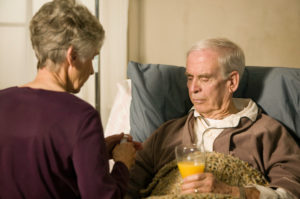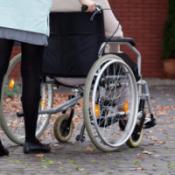 Elders whose caregivers are exhausted, sad, or in poor health are more likely to visit emergency rooms, according to a study published in the Journal of the American Geriatrics Society. The study also found a link between caregiver health and Medicare expenditures.
Elders whose caregivers are exhausted, sad, or in poor health are more likely to visit emergency rooms, according to a study published in the Journal of the American Geriatrics Society. The study also found a link between caregiver health and Medicare expenditures.
Emergency room providers have long asserted that exhausted caregivers may be more inclined to take loved ones with health issues or disabilities to emergency rooms when they need a break—a trend sometimes called “pop drop.” Yet, little research has studied the trend. The new study supports the notion that caregiver stress may be a factor in the need for emergency medical care.
How Caregiver Stress Drives Emergency Room Visits
The study analyzed data on 3,101 couples who lived at home. In each couple, one spouse served as a caregiver to a spouse older than 65 with a disability that affected at least one activity of daily living. Researchers measured caregiver sleep quality, depression symptoms, and overall health using the Jenkins Sleep Scale, Center for Epidemiologic Studies Depression-8 Scale, and caregiver self-reports on health.
Even after adjusting for other factors that might increase the likelihood of visiting the emergency room, the study found a clear correlation between caregiver health and ER visits. In just six months, emergency department visits were 23% higher among care recipients whose caregivers reported high levels of fatigue or poor health. Caregiver fatigue increased Medicare costs by $1,900, with caregiver sadness producing a $1,300 increase in costs.The study did not find a link between disrupted sleep and ER visits or costs. This suggests subjective fatigue, rather than specific sleep outcomes, may play a more significant role.
The study’s authors say their research points to a clear connection between caregiver and care recipient well-being. By intervening with overwhelmed caregivers, emergency room staff may be able to improve the health of both care recipients and those who care for them.
References:
- Ankuda, C. K., Maust, D. T., Kabeto, M. U., Mccammon, R. J., Langa, K. M., & Levine, D. A. (2017). Association between spousal caregiver well-being and care recipient healthcare expenditures. Journal of the American Geriatrics Society. doi:10.1111/jgs.15039
- ‘Pop drop’ study finds more ER visits, higher costs for older disabled patients. (2017, August 24). Retrieved from https://www.sciencedaily.com/releases/2017/08/170824090105.htm
© Copyright 2017 GoodTherapy.org. All rights reserved.
The preceding article was solely written by the author named above. Any views and opinions expressed are not necessarily shared by GoodTherapy.org. Questions or concerns about the preceding article can be directed to the author or posted as a comment below.

 Grounded in Giving: 3 Resourcing Tools for Caregivers
Grounded in Giving: 3 Resourcing Tools for Caregivers A Survival Guide for Caregivers with Depression and Anxiety
A Survival Guide for Caregivers with Depression and Anxiety Caregiver Burnout: When Someone You Love Is Chronically Ill
Caregiver Burnout: When Someone You Love Is Chronically Ill